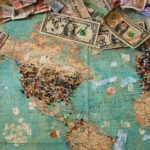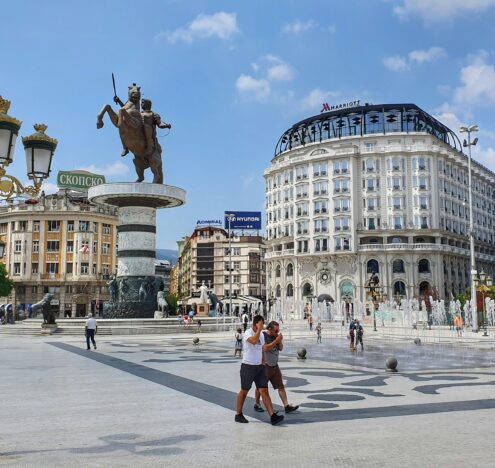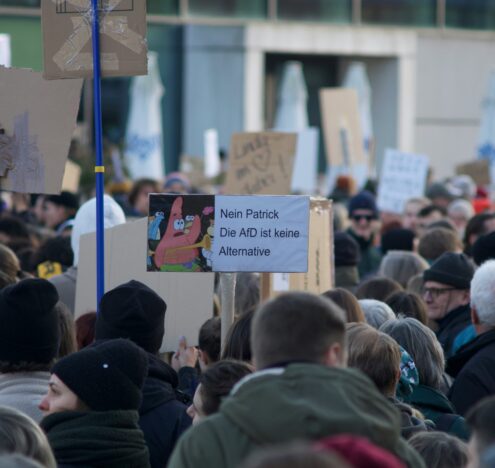“The Changing of a Continent” is a column by journalist Kenneth R. Rosen that focuses on the US trans-Atlantic relationship and Europe’s future.
Strongmen seize the chance to cast blame elsewhere yet embrace the windfalls when they appear. For Venezuela, capitalizing on world demand for new oil has been marginally beneficial for the populace. Food supplies are more readily available, gas prices have stabilized, and fewer people are leaving the country despite losing virtually half its economic capacity. President Nicolás Maduro can use all of these factors to rally his base and court larger favor by pointing to improved conditions under his presidency and a better global standing politically.
Venezuela has turned to Iran for refinery equipment and tankers, offering a new export partner for the Russian ally while courting desperate EU members and the United States as both seek alternatives to Russian crude and liquefied natural gas.
Maduro is not alone in exploiting the war in Ukraine.
A western reluctance to shutter business with those countries means gas and oil prices are dictated by governments whose paltry human rights records persist on the backs of energy demands, perpetuating greater human suffering every time you fill up your gas tank. (I bike or take electric scooters everywhere, a privilege of living in a city.)
This has been true for some time, but what’s new is the emboldened temerity of those who benefit and the costs (human, financial) to those far removed from the ground war in Ukraine.
Here is a not exhaustive year-end roundup of those countries benefiting from the ground war in Ukraine:
AZERBAIJAN
Azerbaijan’s oil-rich despot Ilham Aliyev inked an energy deal with European leaders before assaulting Armenian forces, breaking a ceasefire brokered by Russia.
Authoritarian regimes in Beijing, Cairo, Riyadh, and their aforementioned peers are benefiting because of global reliance on energy from them.
“Azerbaijan has been massively exasperated by international order, liberal attempts to resolve conflicts which are tied to wider democratic transformations that Azerbaijan isn’t interested in,“ Laurence Broers, an associate fellow at the Russia and Eurasia Programme at Chatham House, told me recently.
“Azerbaijan has been very successful in fielding a foreign policy where it appears to be friends to everyone. You can’t really fault Baku. It’s got a good hand, and its played it well.”
HUNGARY
This is at a time when Brussels is working to double its imports of Baku oil (and fast-track an undersea electricity cable) through Hungary, which for the uninitiated, is Europe’s biggest pariah: helmed by another strongman, Viktor Orban.
The deal with Hungary “represents a longer standing strategy to extend tentacles into European institutions and to mitigate their potential for normative criticisms and strictures on Azerbaijan,” Broers said.
TURKEY
A NATO member and seen as a potential negotiating partner between Kyiv and Moscow, Turkey and its president Recep Tayyip Erdoğan prepared a ground invasion of Kurdish territory in Syria as Ankara opened a new route for Russian oil into Europe.
NORWAY
Taking advantage of the situation is not unique to strongmen. Norway has also greatly benefited, to the tune of $200 billion, up from $50 million in annual revenues (or roughly $40,000 for every Norwegian), as some critics called for that “blood money” to be put into a crisis-response fund and to help Ukrainians rebuild after the war. Others were less inclined, stating the money was because Europe “made its own bed.”
Global cooperation is not synonymous with exploitation. Authoritarian regimes in Beijing, Cairo, Riyadh, and their aforementioned peers are benefiting because of global reliance on energy from them. These inconvenient partners have profited politically and economically from the war. This won’t change, and the war in Ukraine presents an opportunity.
As nations seek to find energy alternatives, how can they continue building middle-class and democratically sound institutions on the building blocks of autocratic dependence? Liberal-democratic ideologies seemingly don’t understand where power lies or how to use it. This winter is an endurance of that dependency on others amid a geopolitical pygmy.
And while these links are not always clear, they exist.
Kenneth R. Rosen is a columnist at Inkstick and an independent journalist based in Italy.





















